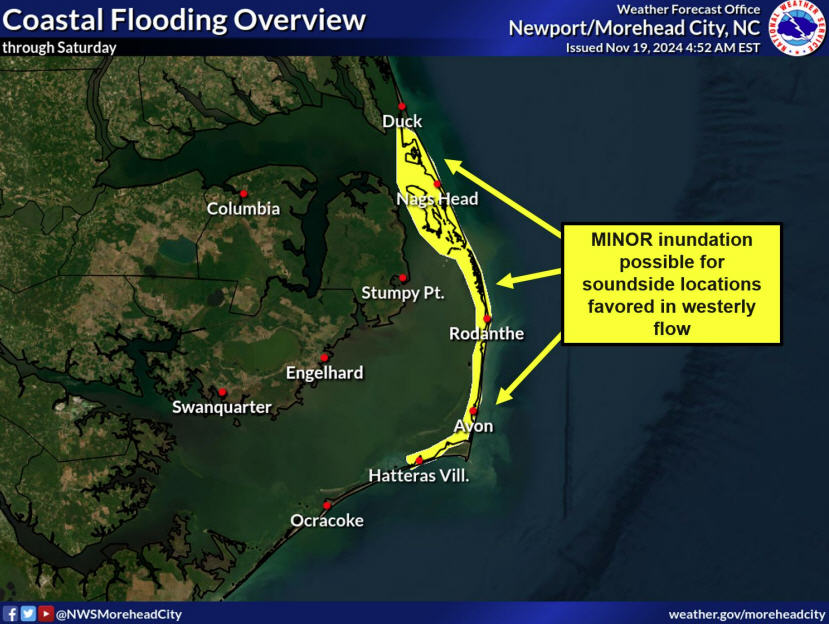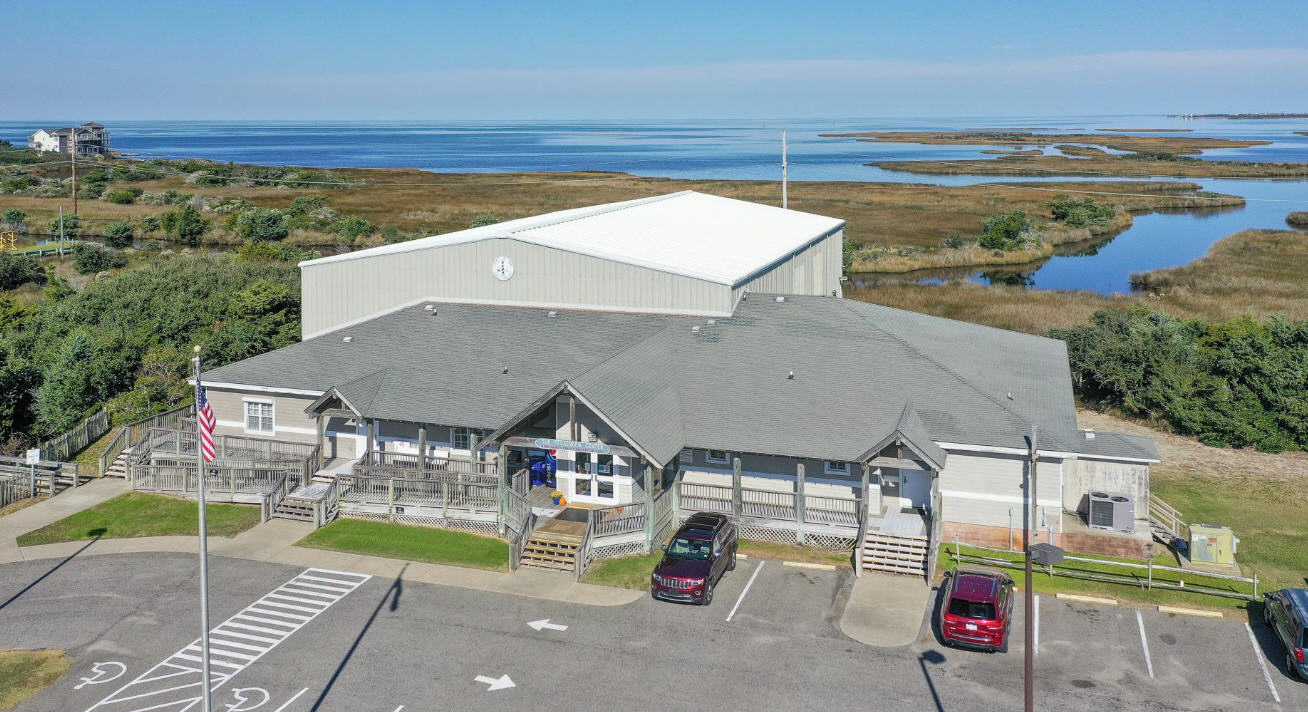FOR MORE INFORMATION To read the complaint in the CHAPA lawsuit again NPS and others go to http://www.obpa-nc.org/Rule/CHAPA-complaint.pdf
Access groups sue to stop Park Service’s ORV plan and final rule
By IRENE NOLAN
By IRENE NOLAN
By IRENE NOLAN
The Cape Hatteras Access Preservation Alliance (CHAPA) today filed a lawsuit against the federal government agencies in the U.S. District Court for the District of Columbia in an effort to stop the Park Service from implementing its off-road vehicle management plan and ORV final rule, which becomes effective next Wednesday, Feb. 15.
CHAPA is a project of the Outer Banks Preservation Association, a group dedicated to preserving and protecting the historical use of the beach on the Outer Banks and specifically the Cape Hatteras National Seashore Recreational Area (CHNSRA), the name Congress gave the first national seashore in 1950.
CHAPA’s complaint names Ken Salazar, Secretary of the Department of the Interior, Jonathan Jarvis, director of the National Park Service, and Mike Murray, superintendent of the Cape Hatteras National Seashore, the shortened name used by NPS.
In its complaint, CHAPA takes issue with just about every step in the process of ORV rulemaking, which, it says, began in earnest in 2005.
“An ORV management plan and a final rule that imposes severe restriction on ORV use at CHNSRA were foreordained from the time that NPS began its planning process,” the complaint says.
“All of the action alternatives identified and considered by NPS provided for highly restrictive buffers that would have effectively prohibited ORV use throughout much of the Recreational Area,” the complaint continues. “In the flawed NEPA and rulemaking process that followed, NPS failed to give meaningful consideration to any views, data, or information that might be inconsistent with the agency’s desired result.”
The plaintiffs claim that the Draft Environmental Impact Statement, the Final Environmental Impact Statement, the Record of Decision, and the ORV management plan and final rule are “arbitrary and capricious” and violate the National Environmental Policy Act (NEPA), the Administrative Procedures Act (APA), the CHNSRA enabling legislation, and the NPS Organic Act.
‘The National Park Service failed the visitors and residents of the Cape Hatteras National Seashore Recreational Area with the final rule which they published on Jan. 23,” said John Couch, president of the Outer Banks Preservation Association. “For the past seven years we have sent a consistent message about importance of preserving ORV access, only to be disregarded at every step. We have no choice but to pursue this matter in court now that the NPS has officially ended the process with the impending implementation of the rule on Feb. 15.”
Jim Keene, representing the North Carolina Beach Buggy Association added, “Many organizations, including the NCBBA, Cape Hatteras Anglers Club, the American Sportfishing Association, United Mobile Access Preservation Association, Dare County Commissioners, and Hyde County Commissioners, as well as thousands of individuals across the country have supported CHAPA and OBPA in this fight. Through this action, CHAPA hopes to continue to earn that support to achieve our ultimate objective.”
Couch said in a media release that OBPA and CHAPA “continuously have maintained that reasonable ORV access and bird and turtle species protection are not mutually exclusive.”
“Unfortunately,” Couch continued, “the Park Service overlooked reasonable recommendations and information that OBPA and CHAPA put forth during the planning process that would have resulted in an ORV management plan and rules that both protect wildlife resources and ensure reasonable ORV access to and over the area’s beaches.”
The complaint says that the Park Service’s planning and environmental review process under the National Environmental Policy Act was plagued by a series of failures. These include, among others, a failure to give meaningful consideration to views, data, or information that were contrary to NPS desire to impose more severe restrictions on ORV access and use; a failure to look at reasonable alternatives, including smaller and more flexible buffer and closure areas; and a failure to properly assess impacts on the local economy.
The seven specific counts in the claims for relief are:
The Cape Hatteras Access Preservation Alliance (CHAPA) today filed a lawsuit against the federal government agencies in the U.S. District Court for the District of Columbia in an effort to stop the Park Service from implementing its off-road vehicle management plan and ORV final rule, which becomes effective next Wednesday, Feb. 15.
CHAPA is a project of the Outer Banks Preservation Association, a group dedicated to preserving and protecting the historical use of the beach on the Outer Banks and specifically the Cape Hatteras National Seashore Recreational Area (CHNSRA), the name Congress gave the first national seashore in 1950.
CHAPA’s complaint names Ken Salazar, Secretary of the Department of the Interior, Jonathan Jarvis, director of the National Park Service, and Mike Murray, superintendent of the Cape Hatteras National Seashore, the shortened name used by NPS.
In its complaint, CHAPA takes issue with just about every step in the process of ORV rulemaking, which, it says, began in earnest in 2005.
“An ORV management plan and a final rule that imposes severe restriction on ORV use at CHNSRA were foreordained from the time that NPS began its planning process,” the complaint says.
“All of the action alternatives identified and considered by NPS provided for highly restrictive buffers that would have effectively prohibited ORV use throughout much of the Recreational Area,” the complaint continues. “In the flawed NEPA and rulemaking process that followed, NPS failed to give meaningful consideration to any views, data, or information that might be inconsistent with the agency’s desired result.”
The plaintiffs claim that the Draft Environmental Impact Statement, the Final Environmental Impact Statement, the Record of Decision, and the ORV management plan and final rule are “arbitrary and capricious” and violate the National Environmental Policy Act (NEPA), the Administrative Procedures Act (APA), the CHNSRA enabling legislation, and the NPS Organic Act.
‘The National Park Service failed the visitors and residents of the Cape Hatteras National Seashore Recreational Area with the final rule which they published on Jan. 23,” said John Couch, president of the Outer Banks Preservation Association. “For the past seven years we have sent a consistent message about importance of preserving ORV access, only to be disregarded at every step. We have no choice but to pursue this matter in court now that the NPS has officially ended the process with the impending implementation of the rule on Feb. 15.”
Jim Keene, representing the North Carolina Beach Buggy Association added, “Many organizations, including the NCBBA, Cape Hatteras Anglers Club, the American Sportfishing Association, United Mobile Access Preservation Association, Dare County Commissioners, and Hyde County Commissioners, as well as thousands of individuals across the country have supported CHAPA and OBPA in this fight. Through this action, CHAPA hopes to continue to earn that support to achieve our ultimate objective.”
Couch said in a media release that OBPA and CHAPA “continuously have maintained that reasonable ORV access and bird and turtle species protection are not mutually exclusive.”
“Unfortunately,” Couch continued, “the Park Service overlooked reasonable recommendations and information that OBPA and CHAPA put forth during the planning process that would have resulted in an ORV management plan and rules that both protect wildlife resources and ensure reasonable ORV access to and over the area’s beaches.”
The complaint says that the Park Service’s planning and environmental review process under the National Environmental Policy Act was plagued by a series of failures. These include, among others, a failure to give meaningful consideration to views, data, or information that were contrary to NPS desire to impose more severe restrictions on ORV access and use; a failure to look at reasonable alternatives, including smaller and more flexible buffer and closure areas; and a failure to properly assess impacts on the local economy.
The seven specific counts in the claims for relief are:
The Cape Hatteras Access Preservation Alliance (CHAPA) today filed a lawsuit against the federal government agencies in the U.S. District Court for the District of Columbia in an effort to stop the Park Service from implementing its off-road vehicle management plan and ORV final rule, which becomes effective next Wednesday, Feb. 15.
CHAPA is a project of the Outer Banks Preservation Association, a group dedicated to preserving and protecting the historical use of the beach on the Outer Banks and specifically the Cape Hatteras National Seashore Recreational Area (CHNSRA), the name Congress gave the first national seashore in 1950.
CHAPA’s complaint names Ken Salazar, Secretary of the Department of the Interior, Jonathan Jarvis, director of the National Park Service, and Mike Murray, superintendent of the Cape Hatteras National Seashore, the shortened name used by NPS.
In its complaint, CHAPA takes issue with just about every step in the process of ORV rulemaking, which, it says, began in earnest in 2005.
“An ORV management plan and a final rule that imposes severe restriction on ORV use at CHNSRA were foreordained from the time that NPS began its planning process,” the complaint says.
“All of the action alternatives identified and considered by NPS provided for highly restrictive buffers that would have effectively prohibited ORV use throughout much of the Recreational Area,” the complaint continues. “In the flawed NEPA and rulemaking process that followed, NPS failed to give meaningful consideration to any views, data, or information that might be inconsistent with the agency’s desired result.”
The plaintiffs claim that the Draft Environmental Impact Statement, the Final Environmental Impact Statement, the Record of Decision, and the ORV management plan and final rule are “arbitrary and capricious” and violate the National Environmental Policy Act (NEPA), the Administrative Procedures Act (APA), the CHNSRA enabling legislation, and the NPS Organic Act.
‘The National Park Service failed the visitors and residents of the Cape Hatteras National Seashore Recreational Area with the final rule which they published on Jan. 23,” said John Couch, president of the Outer Banks Preservation Association. “For the past seven years we have sent a consistent message about importance of preserving ORV access, only to be disregarded at every step. We have no choice but to pursue this matter in court now that the NPS has officially ended the process with the impending implementation of the rule on Feb. 15.”
Jim Keene, representing the North Carolina Beach Buggy Association added, “Many organizations, including the NCBBA, Cape Hatteras Anglers Club, the American Sportfishing Association, United Mobile Access Preservation Association, Dare County Commissioners, and Hyde County Commissioners, as well as thousands of individuals across the country have supported CHAPA and OBPA in this fight. Through this action, CHAPA hopes to continue to earn that support to achieve our ultimate objective.”
Couch said in a media release that OBPA and CHAPA “continuously have maintained that reasonable ORV access and bird and turtle species protection are not mutually exclusive.”
“Unfortunately,” Couch continued, “the Park Service overlooked reasonable recommendations and information that OBPA and CHAPA put forth during the planning process that would have resulted in an ORV management plan and rules that both protect wildlife resources and ensure reasonable ORV access to and over the area’s beaches.”
The complaint says that the Park Service’s planning and environmental review process under the National Environmental Policy Act was plagued by a series of failures. These include, among others, a failure to give meaningful consideration to views, data, or information that were contrary to NPS desire to impose more severe restrictions on ORV access and use; a failure to look at reasonable alternatives, including smaller and more flexible buffer and closure areas; and a failure to properly assess impacts on the local economy.
The seven specific counts in the claims for relief are:
The Cape Hatteras Access Preservation Alliance (CHAPA) today filed a lawsuit against the federal government agencies in the U.S. District Court for the District of Columbia in an effort to stop the Park Service from implementing its off-road vehicle management plan and ORV final rule, which becomes effective next Wednesday, Feb. 15.
CHAPA is a project of the Outer Banks Preservation Association, a group dedicated to preserving and protecting the historical use of the beach on the Outer Banks and specifically the Cape Hatteras National Seashore Recreational Area (CHNSRA), the name Congress gave the first national seashore in 1950.
CHAPA’s complaint names Ken Salazar, Secretary of the Department of the Interior, Jonathan Jarvis, director of the National Park Service, and Mike Murray, superintendent of the Cape Hatteras National Seashore, the shortened name used by NPS.
In its complaint, CHAPA takes issue with just about every step in the process of ORV rulemaking, which, it says, began in earnest in 2005.
“An ORV management plan and a final rule that imposes severe restriction on ORV use at CHNSRA were foreordained from the time that NPS began its planning process,” the complaint says.
“All of the action alternatives identified and considered by NPS provided for highly restrictive buffers that would have effectively prohibited ORV use throughout much of the Recreational Area,” the complaint continues. “In the flawed NEPA and rulemaking process that followed, NPS failed to give meaningful consideration to any views, data, or information that might be inconsistent with the agency’s desired result.”
The plaintiffs claim that the Draft Environmental Impact Statement, the Final Environmental Impact Statement, the Record of Decision, and the ORV management plan and final rule are “arbitrary and capricious” and violate the National Environmental Policy Act (NEPA), the Administrative Procedures Act (APA), the CHNSRA enabling legislation, and the NPS Organic Act.
‘The National Park Service failed the visitors and residents of the Cape Hatteras National Seashore Recreational Area with the final rule which they published on Jan. 23,” said John Couch, president of the Outer Banks Preservation Association. “For the past seven years we have sent a consistent message about importance of preserving ORV access, only to be disregarded at every step. We have no choice but to pursue this matter in court now that the NPS has officially ended the process with the impending implementation of the rule on Feb. 15.”
Jim Keene, representing the North Carolina Beach Buggy Association added, “Many organizations, including the NCBBA, Cape Hatteras Anglers Club, the American Sportfishing Association, United Mobile Access Preservation Association, Dare County Commissioners, and Hyde County Commissioners, as well as thousands of individuals across the country have supported CHAPA and OBPA in this fight. Through this action, CHAPA hopes to continue to earn that support to achieve our ultimate objective.”
Couch said in a media release that OBPA and CHAPA “continuously have maintained that reasonable ORV access and bird and turtle species protection are not mutually exclusive.”
“Unfortunately,” Couch continued, “the Park Service overlooked reasonable recommendations and information that OBPA and CHAPA put forth during the planning process that would have resulted in an ORV management plan and rules that both protect wildlife resources and ensure reasonable ORV access to and over the area’s beaches.”
The complaint says that the Park Service’s planning and environmental review process under the National Environmental Policy Act was plagued by a series of failures. These include, among others, a failure to give meaningful consideration to views, data, or information that were contrary to NPS desire to impose more severe restrictions on ORV access and use; a failure to look at reasonable alternatives, including smaller and more flexible buffer and closure areas; and a failure to properly assess impacts on the local economy.
The seven specific counts in the claims for relief are:
The Final Plan and Final Rule Are Arbitrary and Capricious, an Abuse of Discretion, and Otherwise Not in Accordance With the Enabling Act
The Final Plan and Final Rule Are Arbitrary and Capricious, an Abuse of Discretion, and Otherwise Not in Accordance With the Enabling Act
The Final Plan and Final Rule Are Arbitrary and Capricious, an Abuse of Discretion, and Otherwise Not in Accordance With the Enabling Act
The Final Plan and Final Rule Are Arbitrary and Capricious, an Abuse of Discretion, and Otherwise Not in Accordance With the Enabling Act
NPS’s Use of a DEIS and FEIS That Lacks Sound Scientific Basis and Otherwise Impairs Meaningful Agency and Public Review as the Basis for Its Final Plan and Final Rule is Arbitrary and Capricious, an Abuse of Discretion, and Otherwise Not in Accordance With NEPA and CEQ’s (Council on Environmental Quality) Regulations
NPS’s Use of a DEIS and FEIS That Lacks Sound Scientific Basis and Otherwise Impairs Meaningful Agency and Public Review as the Basis for Its Final Plan and Final Rule is Arbitrary and Capricious, an Abuse of Discretion, and Otherwise Not in Accordance With NEPA and CEQ’s (Council on Environmental Quality) Regulations
NPS’s Use of a DEIS and FEIS That Lacks Sound Scientific Basis and Otherwise Impairs Meaningful Agency and Public Review as the Basis for Its Final Plan and Final Rule is Arbitrary and Capricious, an Abuse of Discretion, and Otherwise Not in Accordance With NEPA and CEQ’s (Council on Environmental Quality) Regulations
NPS’s Use of a DEIS and FEIS That Lacks Sound Scientific Basis and Otherwise Impairs Meaningful Agency and Public Review as the Basis for Its Final Plan and Final Rule is Arbitrary and Capricious, an Abuse of Discretion, and Otherwise Not in Accordance With NEPA and CEQ’s (Council on Environmental Quality) Regulations
NPS’s Adoption and Use of Two Inappropriate “No Action” Alternatives in the DEIS and FEIS Is Arbitrary and Capricious, an Abuse of Discretion, and Otherwise Not in Accordance With NEPA and CEQ’s Regulations
NPS’s Adoption and Use of Two Inappropriate “No Action” Alternatives in the DEIS and FEIS Is Arbitrary and Capricious, an Abuse of Discretion, and Otherwise Not in Accordance With NEPA and CEQ’s Regulations
NPS’s Adoption and Use of Two Inappropriate “No Action” Alternatives in the DEIS and FEIS Is Arbitrary and Capricious, an Abuse of Discretion, and Otherwise Not in Accordance With NEPA and CEQ’s Regulations
NPS’s Adoption and Use of Two Inappropriate “No Action” Alternatives in the DEIS and FEIS Is Arbitrary and Capricious, an Abuse of Discretion, and Otherwise Not in Accordance With NEPA and CEQ’s Regulations
NPS’s Failure to Consider a Reasonable Range of Alternatives in the DEIS and FEIS Is Arbitrary and Capricious, an Abuse of Discretion, and Otherwise Not in Accordance With NEPA and CEQ’s Regulations
NPS’s Failure to Consider a Reasonable Range of Alternatives in the DEIS and FEIS Is Arbitrary and Capricious, an Abuse of Discretion, and Otherwise Not in Accordance With NEPA and CEQ’s Regulations
NPS’s Failure to Consider a Reasonable Range of Alternatives in the DEIS and FEIS Is Arbitrary and Capricious, an Abuse of Discretion, and Otherwise Not in Accordance With NEPA and CEQ’s Regulations
NPS’s Failure to Consider a Reasonable Range of Alternatives in the DEIS and FEIS Is Arbitrary and Capricious, an Abuse of Discretion, and Otherwise Not in Accordance With NEPA and CEQ’s Regulations
NPS Adopted Buffer Distances and Closures Without Considering Relevant Factors Other Than Species Protection, in Violation of the APA, NEPA, the Organic Act, and Enabling Act
NPS Adopted Buffer Distances and Closures Without Considering Relevant Factors Other Than Species Protection, in Violation of the APA, NEPA, the Organic Act, and Enabling Act
NPS Adopted Buffer Distances and Closures Without Considering Relevant Factors Other Than Species Protection, in Violation of the APA, NEPA, the Organic Act, and Enabling Act
NPS Adopted Buffer Distances and Closures Without Considering Relevant Factors Other Than Species Protection, in Violation of the APA, NEPA, the Organic Act, and Enabling Act
NPS’s Failure to Consider Information and Perspectives Differing From the Pre-Ordained Result NPS had Already Decided to Implement is Arbitrary and Capricious, and in Violation of NEPA
NPS’s Failure to Consider Information and Perspectives Differing From the Pre-Ordained Result NPS had Already Decided to Implement is Arbitrary and Capricious, and in Violation of NEPA
NPS’s Failure to Consider Information and Perspectives Differing From the Pre-Ordained Result NPS had Already Decided to Implement is Arbitrary and Capricious, and in Violation of NEPA
NPS’s Failure to Consider Information and Perspectives Differing From the Pre-Ordained Result NPS had Already Decided to Implement is Arbitrary and Capricious, and in Violation of NEPA
NPS Failed to Meaningfully and Accurately Assess the Economic Impacts of the Plan’s and Rule’s Restrictions on Beach Access and Use, in Violation of the APA, NEPA, Organic Act, and Enabling Act
NPS Failed to Meaningfully and Accurately Assess the Economic Impacts of the Plan’s and Rule’s Restrictions on Beach Access and Use, in Violation of the APA, NEPA, Organic Act, and Enabling Act
NPS Failed to Meaningfully and Accurately Assess the Economic Impacts of the Plan’s and Rule’s Restrictions on Beach Access and Use, in Violation of the APA, NEPA, Organic Act, and Enabling Act
NPS Failed to Meaningfully and Accurately Assess the Economic Impacts of the Plan’s and Rule’s Restrictions on Beach Access and Use, in Violation of the APA, NEPA, Organic Act, and Enabling Act
The complaint asks the court to determine that NPS acted improperly and to prevent NPS from implementing its final ORV management plan and rules.
The complaint asks the court to determine that NPS acted improperly and to prevent NPS from implementing its final ORV management plan and rules.
The complaint asks the court to determine that NPS acted improperly and to prevent NPS from implementing its final ORV management plan and rules.
The complaint asks the court to determine that NPS acted improperly and to prevent NPS from implementing its final ORV management plan and rules.
FOR MORE INFORMATION
To read the complaint in the CHAPA lawsuit again NPS and others go to
http://www.obpa-nc.org/Rule/CHAPA-complaint.pdf
FOR MORE INFORMATION
To read the complaint in the CHAPA lawsuit again NPS and others go to
http://www.obpa-nc.org/Rule/CHAPA-complaint.pdf
FOR MORE INFORMATION
To read the complaint in the CHAPA lawsuit again NPS and others go to
http://www.obpa-nc.org/Rule/CHAPA-complaint.pdf
FOR MORE INFORMATION
To read the complaint in the CHAPA lawsuit again NPS and others go to
http://www.obpa-nc.org/Rule/CHAPA-complaint.pdf
Subject
Name
(required, will not be published)
(required, will not be published)
City :
State :
Your Comments:
May be posted on the Letters to the Editor page at the discretion of the editor.
May be posted on the Letters to the Editor page at the discretion of the editor.
May be posted on the Letters to the Editor page at the discretion of the editor.
May be posted on the Letters to the Editor page at the discretion of the editor.












